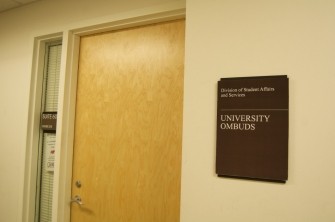Got A Conflict? Call Ombuds

If you aren't a lawyer, words like "mediation" and "negation" may be a little intimidating. But when conflicts come up, these resolution methods can help you make the best of the situation. So what do you do when you need to mediate or negotiate, but aren't sure where to start? Call upon the Office of the University Ombuds to guide you to a successful resolution.
What can the ombuds do for you?
As a graduate student, your studies often take place within a small professional circle. If something goes wrong in the lab, with your advisor or your program, you may be unsure where to turn for assistance. This is where the University Ombuds staff come in: they provide a safe space for neutral and informal conflict resolution. All students are welcome to bring their university-related issues to the office. Interactions are kept confidential, excluding those mandated by federal or state law to be reported, such as sexual assault or harassment. Associate Ombuds Kim Fulbright says, "Having a place to talk about university-related issues can be very helpful. We can listen, educate about any relevant policies or rules, and help generate options for resolution."
What are some common reasons you might call upon the ombuds?
Balancing school and a burgeoning professional career is a rewarding, but often hectic situation. You may run into issues trying to work productively with your advisor, getting along with lab mates and dealing with the specifics of your program requirements. "Our office provides graduate students with conflict coaching, or we can do a mediation to help graduate students have control of how they want to handle their own issues going forward," says Kim. The ombuds can be as involved in the process as you'd like; maybe you want to just get some advice, or you might be comfortable with bringing an ombuds into the situation directly. Either way, the level of involvement is up to you.
What are some quick tips you can use in any situation?
Kim stresses that every student's situation is different and contextual, so it's important to know the entire story. If you are facing a specific conflict, it's best to speak with an ombuds directly. Still, she has some simple conflict resolution skills you can use when dealing with a challenging situation, or when you're having a difficult time working with someone. "Always be open to the other party's perspective. Try to be curious and learn why they behave the way they do," she says. "Being able to communicate your perspective in a nonjudgmental and non-defensive manner can also help in challenging situations. Conflict resolution is based on skills that can be learned."
What are some situations when you should go elsewhere for help?
University Ombuds is required to report any situations involving imminent risk of serious harm, and matters mandated by federal or state law to be reported. The ombuds encourage you to contact 911 or talk with the police first when faced with a situation that falls into these categories. "We are not an office that provides public safety," says Kim. "If there are laws that are being broken where someone's safety is at risk, it is always important to involve trained professionals."
Are there programs you can attend to learn more?
While the University Ombuds do not have planned workshops open to the public, they do offer a variety of training programs and workshops that can be set up in advance within the UC community. "We schedule based on requests, and we are always happy to do them," Kim says. "For example, this week we visited a Learning Community for first year students and a fraternity. We provide workshops for undergraduate and graduate students, staff and faculty." Workshops include Conflict Management Skills that Work, Dealing with Difficult People, and Reality Bites. These programs deal mostly with conflict resolution, but can be tailored to fit the needs of your specific group. Contact the University Ombuds office to learn more about developing a workshop.
Next time you're faced with a university-related conflict, remember that you don't need to resolve the situation all on your own. Don't hesitate to reach out for support from the ombuds. They are trained professionals who are there to give you sound advice and teach you how to deal with the situation. Resolve that argument with your lab partner, come to an agreement with your professor or straighten out ambiguous program requirements by working with the University Ombuds office.
Written by Dakota Wright, Graduate Assistant to the Graduate School Office